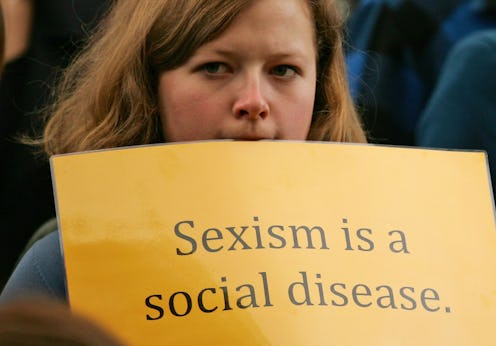Life
What is "Benevolent Sexism"?
Did you know that not all sexism is deliberate or overtly nasty? There's a subtler kind of sexism, a kind that disguises itself in niceties and platitudes but is harmful nonetheless, and Rikki Rogers wrote about it for Forbes today. The term for that kinder, gentler sexism, if you can call it that, is "benevolent sexism" — that which invokes stereotypes of women and men that aren't negative, per se, but which constitute stereotypes nonetheless. In other words:
Ambivalent or benevolent sexism usually originates in an idealization of traditional gender roles: Women are “naturally” more kind, emotional, and compassionate, while men are “naturally” more rational, less emotional, and “tougher,” mentally and physically.
Though Rogers has written on the topic of benevolent sexism before, she's considering it again in an effort to offer advice for its victims:
I do think it’s our (and by “our” I mean that of professional people who hear, overhear, and can identify benevolent sexism) responsibility to call these comments out for what they are and force the speaker to really think about the (potentially subconscious) stereotypes underlying his or her words.
Consider a woman who's always asked to serve as meeting note-taker at the office (on the assumption she's good at secretarial tasks), the athletic man who is asked to help remove a homeless person from the office premises (on the assumption that he's strong and brave), and a man whose pecan pie is over-praised because his wife didn't help (assuming they are bad and good at baking, respectively). What can the objects of, or witnesses to, such benevolent sexism do?
Rogers suggests using humor to deflect the comment, pointing out the objective characteristics of the person instead of accepting the stereotype, and reflecting on the ways that benevolent sexism may have contaminated one's own thinking. Hopefully these strategies work. I'd love to live in a world where people are treated as individuals — especially in workplaces where people should at least know each other for their specific professional strengths, not just by their genitals. Here's the rub, though: if "gendered expectations" really do shape people's behavior in the way feminists suggest, then benevolently sexist statements may actually be to some degree warranted.
That bro in the office who always cajoles you into taking meeting notes? He really has experienced a world in which women write more neatly and organize things better than men. That boss who asks the office manly man to deal with the homeless guy loitering in the bathrooms? He really has noticed that men are braver and more confident in approaching potential physical altercations than women. Comments about women's and men's cooking and housekeeping? Yup, they very well may come from lives in which the women mostly cooked and the men mostly stood ineptly by. Rogers has conveniently ignored whether some of the stereotypes embodied by benevolent sexists might have some truth, however limited, to them.
How can we challenge the sexist component of people's assumptions without insisting that their observations and inferences must be inaccurate? Suggesting that we mustn't talk about gendered trends in behavior even if there's something to them is just another silencing — exactly the kind of thing upon which we liberal people frown. And, as a woman in particular, the real danger in responding to benevolent sexism is that you might play into the old woman-be-crazy stereotype: "Geez, why can't you feminists even take a compliment?"
To handle this situation well, you have to understand what's really going on. Intentions aren't the only thing that matter morally: even benevolent sexism has ill effects, in that it corrodes social morale and seems at least to correlate with men doing better than women on a variety of measures (income, literacy, education, etc.) But many benevolent sexists do in fact have good intentions, or no intentions at all: they're parroting soundbites they've inherited from others or are under the impression that they're offering a compliment. These are less morally culpable scenarios than that guy who harasses you in the street.
So here's my suggestion to you: You won't get far in dealing with benevolent sexists by pulling out your Big Feminist Book 'O Intersectionality and starting to lecture. In fact, that we're even focusing on benevolent sexism these days is evidence of just how far we've come, gender issues-wise. Feel free to point out the underlying stereotype of a benevolent sexist if possible and if you feel so inclined, but don't make fixing others' crude gender stereotypes your own personal cross to bear. Just behave honestly — whether you're stereotypically feminine or masculine or both or neither — and reasonable people who truly hold mistaken gender stereotypes will update their assessments of the world in due time.
